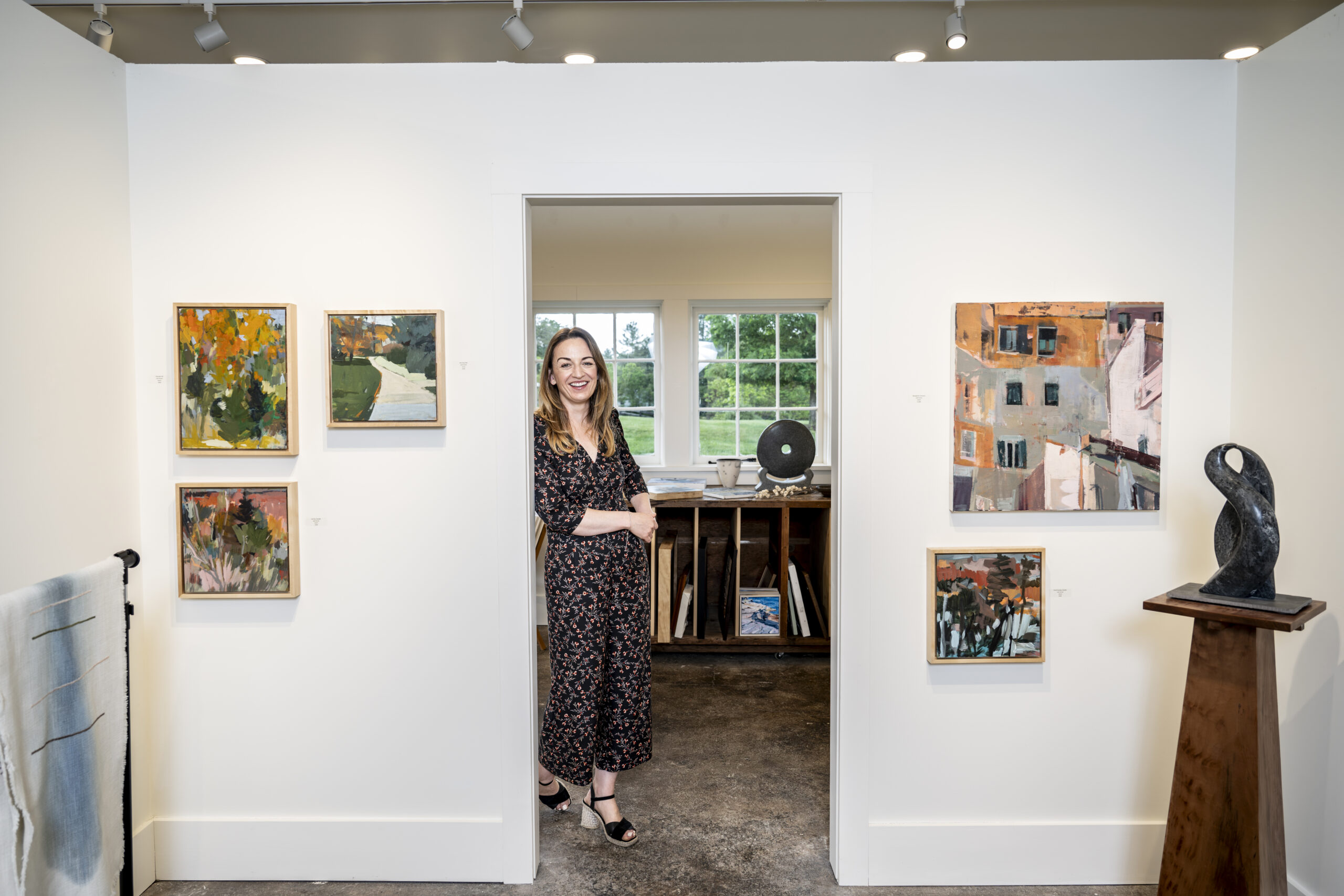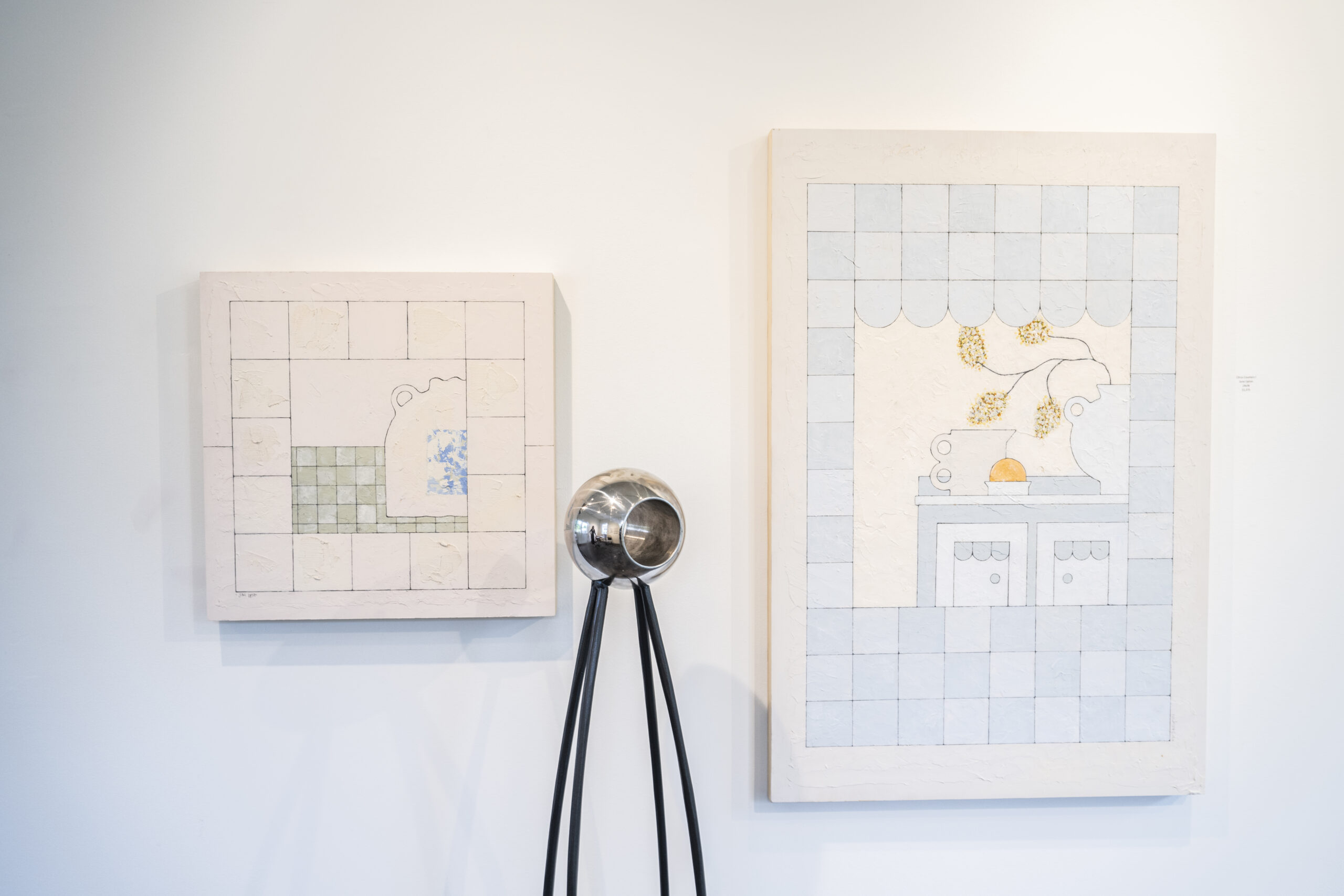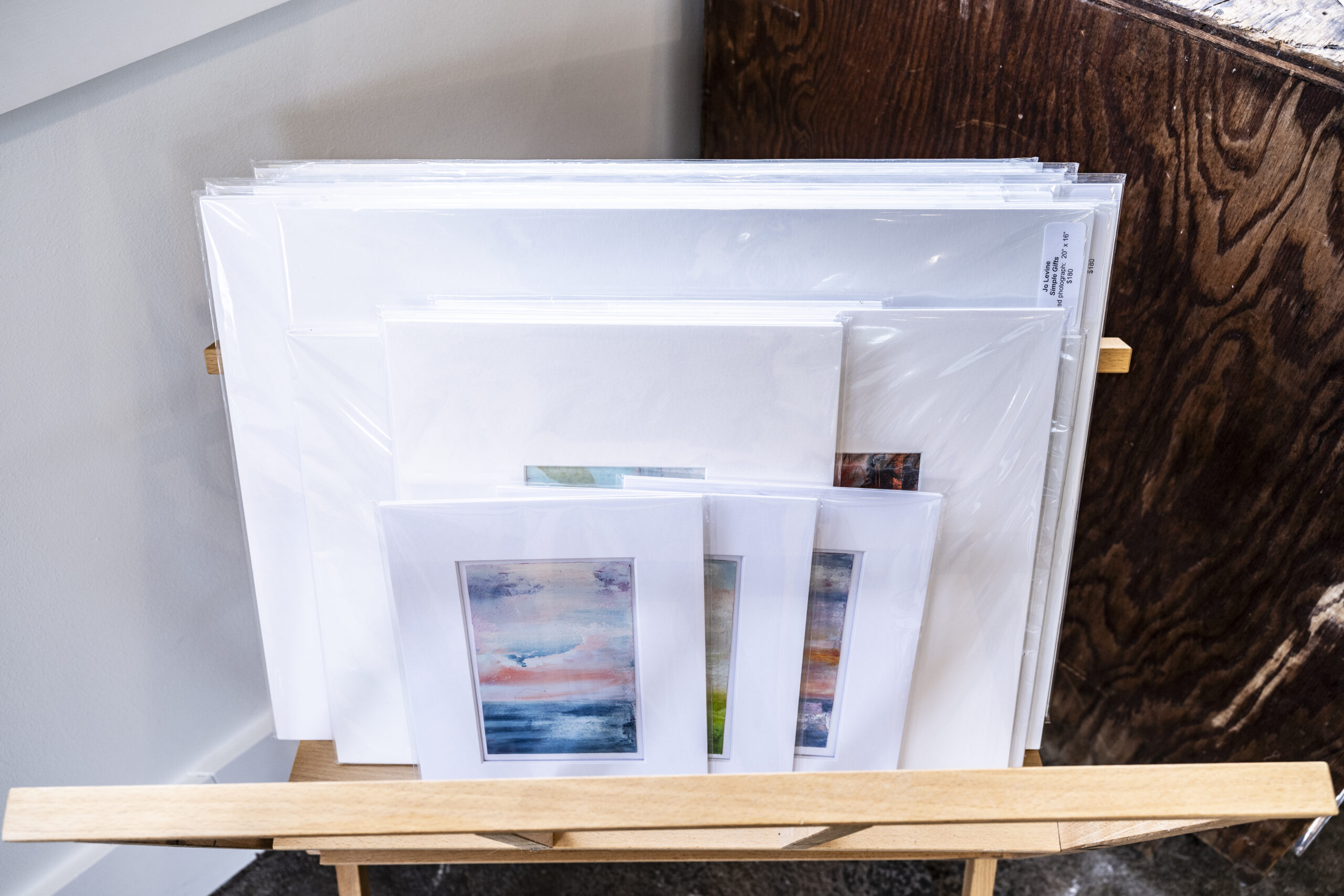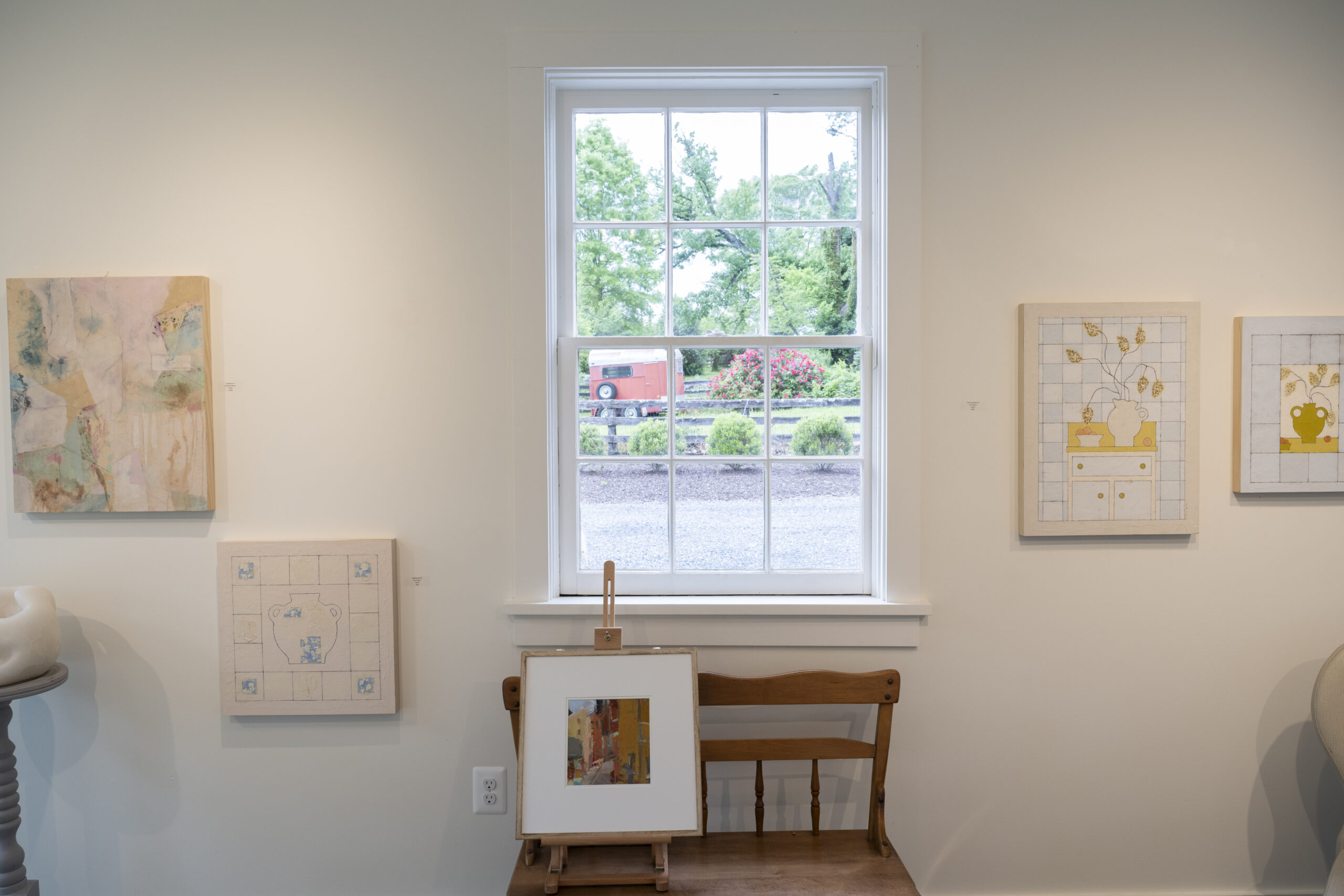Dwell Fine Art & Craft: In the Business of Beauty
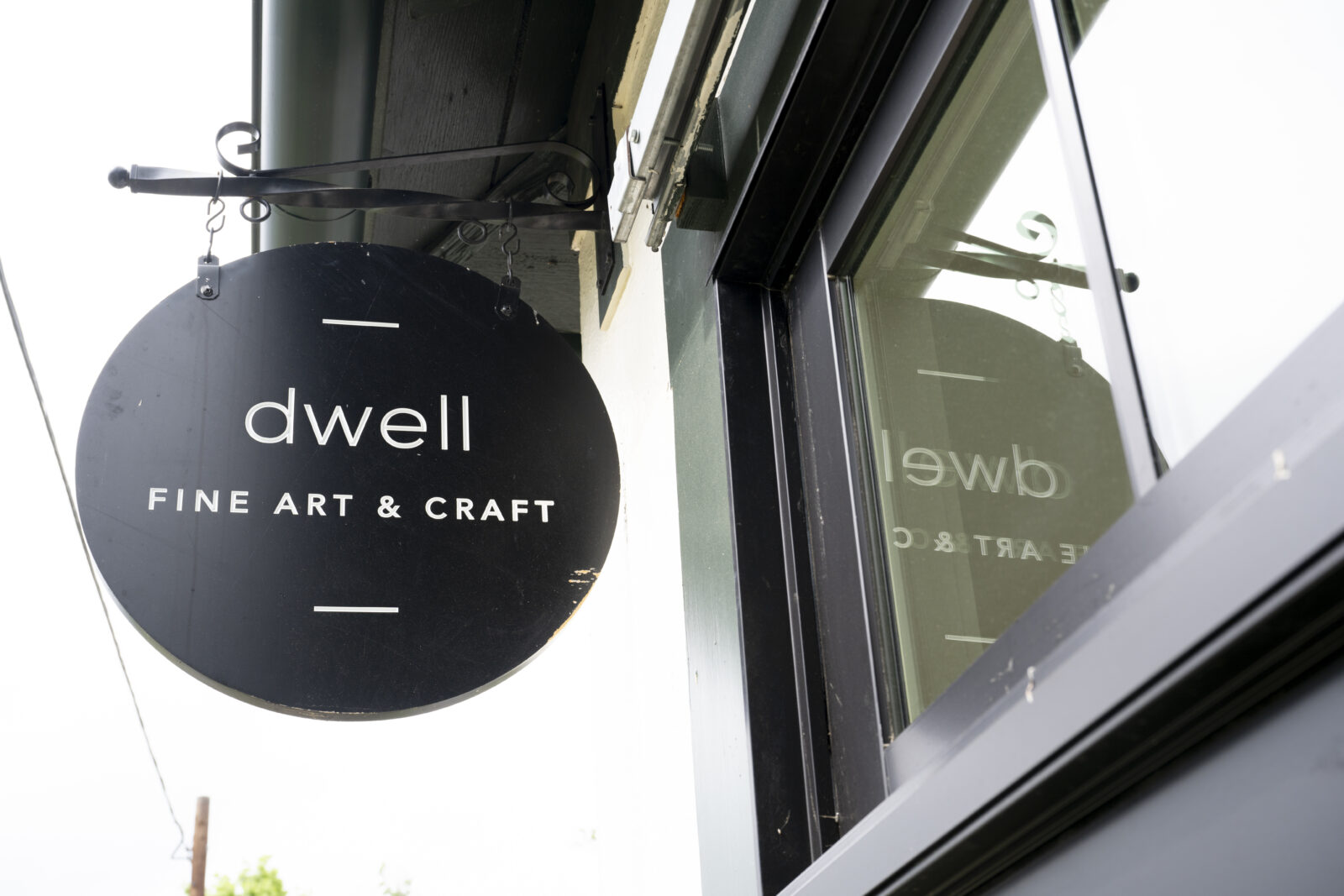
Written by Bill Kent | Photos by Michael Butcher
Ever wonder if a piece of art you own could be worth a fortune?
At least once a week, someone knocks on the door of what was once an old gas station, now an art gallery, in Hume. They bring something and want to know what it’s worth.
Hayley Sykes brought Dwell Fine Art & Craft from Alexandria to Hunt Country. Since then, word has gone around that, in addition to representing 27 artists, hosting monthly gallery shows and receptions, and creating a venue for art teachers and local craftspeople, Sykes is also an art appraiser. She currently has 30 regular clients who use her services to determine the fair market value of their artwork.
Sykes acknowledges that one of the great myths of the art world is that there are more undiscovered masterpieces in yard sales than in museums and auction houses. Every so often, however, this dream does come true. She also emphasizes that the dollar value of art has more to do with what someone is willing to pay for it — which cannot be predicted with any certainty — rather than the opinions of friends, experts, or the artists themselves.
Her first question for potential clients, as well as the 30 others who have had her appraise art for insurance, charitable donation, estate liquidation, or equitable distribution in a divorce, is why they want to know what the art is worth.
“This can open up an entire world of possibilities because every work of art has a story behind it, especially those that matter to people in some way. I want to listen to that story, because that’s part of the reason the art, and these people, have found me,” she shares.
With degrees in fine art, fashion, art history, and art appraisal, Sykes can go on about how current events, peculiar details in the work, the number of previous owners, or historical circumstances can make the value of the most prestigious works go up or down. She can also describe the amount of research a typical art appraisal requires, and why it usually runs to 30 or so typed pages of detailed description.
But what matters most to her “is how it brings people together. That’s the magic of art. And that, I suppose, is why I’m here.”
Born in the United Kingdom in West Riding, Yorkshire, Sykes admits that she is the unlikeliest person to get into the gallery business. “I wanted to be a fashion designer. My mother was a seamstress and I was fascinated with how she put so many odd pieces of cloth together to create a truly beautiful dress.”
Neither her mother nor her father, who worked in a pharmaceutical factory, were “art people.” She continues, “We didn’t have art in our house, but they indulged me when I wanted to study fashion.”
After earning a degree from John Moores University in Liverpool, she found her favorite fashion companies weren’t hiring. International business head-hunting firms were, and that job took Sykes to Sydney, Australia, where she met American mergers and acquisitions consultant Brett Ludden on a bus. They discovered they both liked art and were soon married.
In 2006, they settled in Alexandria. When Sykes was not poring over corporate resumes, she was looking at art in museums, galleries, and artists’ studios. She increased her appreciation with a degree in art history from Virginia Commonwealth University and was surprised when some local artists offered her work to sell.
“I knew a few collectors from my contacts in the business world but I wasn’t about to approach them directly or compete with the established galleries. Frankly, I just wanted my friends who were artists to feel like their art was being seen and appreciated,” she explains.
She came up with the idea of hosting a pop-up gallery in locations where people might give fine art a second glance. She wanted to escape the chilly, unapproachable atmosphere she encountered in some galleries. She named the pop-up Dwell because “I like the idea that people will live with and enjoy beautiful things, [and] that works of art should be part of our environment if we are lucky enough to have them, not stored away.”
The art she showed found homes. Visitors to her gallery added their names and contact info to her guest book. Her website got hits; her email list began to grow. People began to seek her out in Alexandria, and, when she and Ludden relocated to Hume, at pop-ups in The Plains and Washington, Virginia.
Sykes decided to make it official, and professional: She became a certified art appraiser. She shares, “It is an ethics-driven business. That means you should be able to trust the appraiser to give you a researched, expert opinion about the fair market value of the work, and nothing more. The appraiser shouldn’t offer to sell the art or take a commission from the sale.”
Among those who trust Sykes’ judgment is Fred Ballerer, an art collector and art museum board member living in Great Falls. He was introduced to Sykes by an artist friend. “She’s appraised five pieces for us and she has proved very knowledgeable and very thorough.” He respects Sykes’ eye as a gallery owner, but has not bought any work from Dwell because “I don’t have any wall space left.”
Peter Schall, a retired banker and art collector in Marshall, has acquired art from Sykes. “My wife Marla and I were riding our bikes and we came upon her gallery by accident.” Schall had heard of Sykes as a corporate headhunter but had never met her personally. “We hit it off and I guess we’re now what you call regulars, in that we come to as many of Hayley’s artist receptions as we can.”
Schall continues, “What we like about her gallery is that it’s really down to earth. There’s nothing hoity-toity. The gallery has become for us what Marla calls a place where people can be surrounded by beauty.”
For equestrian and fine art photographer Tara Jelenic, her first art show reception at Dwell came with a warning. “Hayley told me sometimes nobody shows up for an opening. Sometimes they get more. Either way, you deal with it.”
Jelenic brought her family and invited friends from Alexandria and the District, as well as from Warrenton, where she lives. She gave them directions to Hume but was afraid they’d get lost, or not show up.
When the first car rolled into the small parking lot behind the gallery, Sykes uncorked a bottle of sparkling wine. Another car arrived moments later. Within minutes the lot filled. Cars took over spaces at the front of the post office. Then the cars filled up both sides of Leeds Manor Road.
“We almost had a fender bender out there, we had so many people,” Sykes recalls. At least 80 people packed the gallery, many from out of state — and that’s just those who signed the register. “We had so many in the gallery,” Sykes says, “I wasn’t sure if they could see the art.”
Enough did. Though this wasn’t Jelenic’s first gallery show, it was a peak in a 30-year career. Just as Sykes had hoped, “I felt my work was being seen and taken seriously,” Jelenic says.
For Sykes, it was proof that art can bring artists, collectors, and “some of the most interesting, amazing people that you wouldn’t think would ever find you” together. ML
Hayley Sykes’ tips for those considering having a work of art appraised:
1. Ask yourself why you want to know the value of the work. If it is for insurance, property tax, estate settlement, a gift, or equitable distribution of family property, an appraisal may be necessary. If you want to find out how much the selling price may have gone up or down, you may be wasting your money and the appraiser’s time.
2. An appraisal does not guarantee a sale price or a specific tax deduction if the art is a gift to a nonprofit or charitable institution like a museum. “An appraisal is an educated, professionally researched opinion.”
3. If you’re appraising art for insurance purposes, make sure you understand the policy. “Works of art are unique items. Some insurance policies treat art like furniture. Others are more nuanced.”
4. The appraiser should let you know exactly how they will determine the fair market value of the work and offer you either a flat or hourly fee. An appraiser should not offer to sell the work, or take a percentage when the item is sold. If the appraiser owns a gallery, or is employed by one, the appraiser should not value any work of art sold through that gallery.
5. Ask if the appraiser is certified. “This lets you know the appraiser is qualified to value the work competently and correctly.”
6. Trust your feelings about the appraiser. “As an appraiser, I may be visiting your home or place of business to examine the art and ask questions about it. You should be able to trust me and feel comfortable with that. Appraising is a business, but it shouldn’t be all business.”
Published in the June 2024 issue of Middleburg Life.


